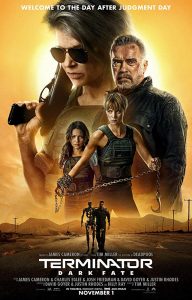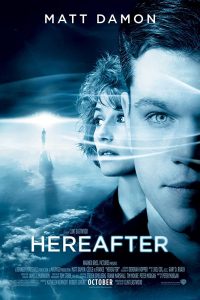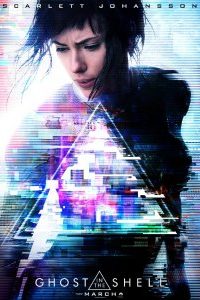Another Future Rolls off the Assembly Line: Josh Pearce and Arley Sorg Discuss Terminator: Dark Fate
 This review doesn’t need to lead with much of a recap, because you’ve seen it all before: evil AI sends a killer robot back in time to assassinate the future savior of humankind. Plucky human resistance sends a protector back in time to stop the killer robot (from the future!). Carnage. Mayhem. Explosions.
This review doesn’t need to lead with much of a recap, because you’ve seen it all before: evil AI sends a killer robot back in time to assassinate the future savior of humankind. Plucky human resistance sends a protector back in time to stop the killer robot (from the future!). Carnage. Mayhem. Explosions.
The difference this time is that the evil AI is called “Legion” instead of “Skynet,” the target is a young woman in Mexico City named Dani (Natalia Reyes), the resistance sends an augmented human named Grace (Mackenzie Davis) to protect her, and the new Terminator is something called a REV-9 (Gabriel Luna). Linda Hamilton returns as Sarah Connor, and Arnold Schwarzenegger as a T-800 cybernetic organism with decidedly aged living tissue over its robotic endoskeleton.
Josh: I have questions.
Arley: Please save your questions for the end.
The Terminator franchise has proven itself caught in an infinite loop in both narrative and meta-narrative forms. The machines rise up because humans use advanced technology from the future to bootstrap an AI…which then sends advanced technology from the future back in time. The resistance is led by John Connor who is only born because… a soldier sent (by John) from the future impregnates his mother. Like the Star Trek: TNG episode “Cause and Effect”, they’re caught in a “temporal causality loop”—a loop with no entry point. And now that the audience has come to expect certain things from these movies—”I’ll be back,” “Come with me if you want to live,” a car chase at the 20-minute mark, a showdown in an industrial setting at the end—the filmmakers keep serving up the same movie on repeat; another loop with no exit point.
Arley: This whole thing is an action movie. The original Terminator was a science fiction horror movie with action notes, and some thoughtful commentary or philosophy. But this one is flat-out action, any commentary is heavy-handed or clumsy or muddled, and even the science fiction is so thin as to be non-existent or ridiculous. All the action scenes looked like superhero battles, not just in the sense of the power of the fighters, but also in the way that those scenes were shot. In the underwater scenes, the REV-9 looked like Aquaman. I mean, maybe it makes some sense that a robot would move that quickly and fluidly, but it doesn’t work well in this movie.
Josh: Well, like you said, the first movie was horror, but none of the sequels are. The stop-motion jerkiness of the original robot made it uncanny and creepy. CGI makes the Terminators less scary. With CGI, you don’t need fancy camerawork or shadows to hide things, so the monster is fully revealed all the time and moves so fluidly (doing parkour and shit), which leaves nothing to the imagination, and the imagination is the scariest thing.
Arley: The horror (in the original) is the slow-paced, inexorable pursuit of something that can’t be stopped or reasoned with.
Josh: Like It Follows (great horror movie). Same problem with the Alien franchise, starting with Alien 3. CGI aliens shown in full-body, instead of using puppets from the shadows. Also like Alien 3, the beginning of Dark Fate completely erases all the accomplishments of its preceding film—in this case Judgment Day. What is even the point, then? I suppose Sarah Connor gets closure and some kind of completed character arc, but multiple characters keep saying the point of their actions is “make your own fate” although that’s demonstrably not true: oh you defeated Skynet and changed the future, but this exact same other future came into being, complete with Terminators and a chosen one narrative.
Arley: Okay. I did have fun, and people in the theater had fun, it was obvious from their reactions. But I wouldn’t call this movie good, and I wouldn’t call it science fiction except by the weakest, most lenient terms. And I wouldn’t call it innovative by any stretch. Plotholes and inconsistencies are going to create universal reactions. People clapped and shouted but came out of the theater ranting about all the problems.
Josh: It certainly wasn’t the worst Terminator movie I’ve seen.
Dark Fate does hint at possible alternate storylines that could expand beyond the recycled plots seen so far: all this time, Sarah Connor has been hunting Terminators that are continuously being sent back; the T-800 has been pretending to be human for nearly 30 years; and even some of the future battle scenes looked interesting.
Arley: I liked the future scenes the most. I wanted a whole movie set in that future.
Josh: Isn’t that what Terminator: Salvation was?
Arley: I can’t even remember. I must have blocked it out.
Josh: Though I guess if you want a good Terminator future movie, you could just rewatch Screamers.
Arley: That was a good movie.
The most obvious variance that Dark Fate presents is the focus on three women as the main characters. Grace and Sarah’s tag-team defense of Dani plays to their strengths and keeps the dynamic moving along, but every time the action slows, the weakness of their chemistry shows through. The emotional beats fall flat or are unrealistic. Sarah and Grace’s constant sniping continues far past initial tolerable levels (because we certainly couldn’t have two powerful women in the same movie without them being at each other’s throats the whole time).
Arley: I was excited for Linda Hamilton’s return but, for me, she is just good enough in this. She delivered all the “cool lines” as expected. I like seeing her badassery, which hearkens back to T2 (totally a positive) but that’s undermined by the way the women can’t get along well together. However, all three of their physical performances are great.
The deaths of Dani’s father and brother are forgotten almost immediately, and not even her uncle seems to care enough to mourn. She instead latches onto Grace, screaming, “I’m not going to watch you die!” before the movie is even halfway over, having known each other for less than 24 hours. Grace’s love for Dani is more understandable, given that she has known her longer in the future, but the converse seems unlikely.
The feminist message, as presented, is fine—women have value other than their wombs—but it was telegraphed heavily from the beginning, so the reveal of the savior wasn’t all that shocking. It’s still a chosen one story, but at least the chosen one isn’t a white guy with the initials “J.C.”
Josh: James Cameron.
Arley: I think gender is really great in this movie, mostly. But you do have the factor of: three women, two are badasses, and they still have to go to Arnold for help. Compared to Mad Max: Fury Road, where the women don’t need Max to save them. Were there any female writers on this at all?
Josh: I thought Arnold was great, by the way. Excellent humor. He was the most natural, or at-ease, performance in the whole film, but I guess he’s been doing Terminator movies more than all the other actors.
Arley: The Terminator’s family moments are more emotional and effective than the moments between actual humans. He has more humor and pathos and humanity than any other character.
Josh: I also liked Gabriel Luna’s performance, though he was too charismatic to convince me that he was a robot most of the time. I didn’t understand how he was talking his way past everything. Was he absorbing people’s memories? The movie skims right past his abilities and limitations.
Arley: Why does the REV-9 need physical contact to mimic a person? And if its clothes are part of its body, why does it show up from the future naked? There were so many problems with the SFnal ideas. The more they explained the more it didn’t make sense. They gloss over that one scene by saying, “Future shit”—I loved that line! I wish they’d done that more, especially since a lot of times it’s reasonable that the characters themselves might not know or understand something. Instead the narrative gave so many dumb explanations for things that didn’t need explaining. Trust your audience to come up with their own theories.
Josh: The answer, of course, is nanomachines, AKA magic. It’s a ratchet—once they used nanotechnology in Terminator 3, they could never go back, just have to keep trying to escalate. I came across an interview with Tim Miller about the making of this movie: he put Joe Abercrombie, Neal Asher, Greg Bear, Neal Stephenson, and Warren Ellis in a room together to come up with ideas. Almost all of them have done wildly varied and imaginative nanomachine stories (The Polity series, Slant, The Diamond Age, Transmetropolitan), so the nanotech in Dark Fate could easily have been a thousand times better. Oh, and then Miller says, “We had sort of a f—ed up process, in that we had decided what these action set pieces were, but the script was still being written.” So that gives you a pretty clear idea of what this movie’s about.
Arley: Those authors also, you know, are capable of forming a plot, telling a story. I’m guessing their ideas were grabbed and cobbled together and so much of what they contributed was discarded. Some of the action was good. I liked the underwater stuff, Aquaman aside, and Arnold coming to the rescue was a fun (albeit potentially gender-problematic) sequence.
Terminator: Dark Fate is already projected to lose money, the first movie in the franchise to not turn a profit, despite a heavy marketing campaign as well as a release date with few other action-genre competitors. The marketing is actually a detriment to the viewing experience, since the trailer gives away so much that one might imagine they can see the future as they watch this movie. Soon as one action scene finishes, you’re checking it off against the list of things seen in the trailer and tallying how many more set pieces are left. One in particular, showing the REV-9 in a CBP detention center, gives away a significant amount of plot: the heroines declare that they’re going to sneak across the border from Mexico into Texas, but we already know that’s destined to fail before it’s even started.
Josh: The original Terminator attacked a police station and killed a bunch of cops because he was explicitly a bad guy. The second Terminator attacked police but did not kill them because he was nominally a good guy. The T-1000 (who gets my vote as the most villainous Terminator except for maybe the original) didn’t have a wholesale slaughter scene, but the REV-9 in Dark Fate is allowed to kill a bunch of CBP agents. Do you think that’s because CBP is safe to be vilified right now?
Arley: That ties into something I want to say about the portrayal of race in Dark Fate. I felt like the movie was really wishy-washy in its messaging vis a vis gender and race. I agree that they’re painting border patrol as bad guys. However, let’s cycle back: the bad robot is brown. He’s Latino, and the Latina girl is being saved by white ladies. Dani automatically knows how to cross the border illegally, implying that anyone brown knows these things. There are literally trainloads of people crossing the border illegally, which plays on the phobic fears and assumptions of people who are already visualizing that kind of thing. Oh and her uncle is a coyote. So they’re painting border patrol as bad guys, but they’re also painting all brown people (and their families) as illegal immigrants who are casually coming across the border in hordes. So there’s racism and also the vilification of the border patrol as assholes.
Josh: Well, we’re nearly at the end, so let’s recap what we liked: I liked Arnold and the design of the REV-9. The way its skeletal version stood up was uncanny and creepy! The Terminators in the future, with the tentacles, were interesting, brief as they were. I also thought Mackenzie Davis was pretty solid—I enjoyed Halt and Catch Fire, which was the first thing I saw her in, and she was great in Blade Runner 2049. This is the first time I’ve seen her in an action role, and I thought she handled it really well.
Arley: Her skin was cool, with the grids showing that she has mesh underneath. Future battles were awesome, and I was engaged with the underwater scene with the Humvee. There were some good lines. I liked seeing women in action roles, as well as women in different kinds of roles in general.
Josh: Time for some questions. So Arnold’s organic material ages on its own? Does that mean he’ll one day be like a 2,000-year-old mummy on a polymetallic alloy skeleton? If Legion has access to nanomachines, why not gray goo the past? How does Grace not know that cell phones are tracking devices? Couldn’t they have used the power cell from Arnold, as was the plot of Terminator 3? And so on, there are a ton of others. Also, isn’t it highly unlikely they’d just blast their way onto an AFB by driving the wrong way through the gates, and then make it up the loading ramp of a C-5 without any problems? These places have crash barriers for a reason.
Arley: Having grown up in an Air Force family, let me tell you: they fucking check ID. They’re not just going to let you drive through because some guy on the radio is screaming about it.
Josh: I find myself rolling my eyes at a lot of implausible stuff, but then I remember that the entire premise of the franchise is “killer robots from the future” and then I remember to put it all in context. This was a solidly average killer robot movie.
Arley: It’s unfortunate that we only have time to cover so many movies, because there were a few out at the same time (Doctor Sleep, for example) that are more interesting than Dark Fate. That we’d be trashing far less.
Let’s rank the Terminator series:
Josh: The original, Judgment Day, Sarah Connor Chronicles, Salvation, Dank Fart, Terminator 3, and then Genysis. (I like Judgment Day the most, but the original is a better movie. Sarah Connor Chronicles and Salvation get points for originality and trying to do something.)
Arley: Original, T2, Sarah Connor Chronicles, Dark Fate, and then the other three lump together as completely forgettable.
Directed by: Tim Miller
Written by: James Cameron, Charles H. Eglee, Josh Friedman, David S. Goyer, Justin Rhodes & Billy Ray, based on characters created by James Cameron & Gale Anne Hurd
Starring: Linda Hamilton, Arnold Schwarzenegger, Mackenzie Davis, Natalia Reyes & Gabriel Luna

ARLEY SORG, Associate Editor, grew up in England, Hawaii, and Colorado. He studied Asian Religions at Pitzer College. He lives in Oakland, and usually writes in local coffee shops. A 2014 Odyssey Writing Workshop graduate, he is soldering together a novel, has thrown a few short stories into orbit, and hopes to launch more.
JOSH PEARCE, Assistant Editor, started working at Locus in 2016. He studied creative writing at SFSU and has sold short stories and poems to a variety of speculative fiction magazines. Born and raised in the Bay Area, he currently lives in the East Bay with his wife and son and spends way too much time on Twitter: @fictionaljosh. One time, Ken Jennings signed his chest.
 While you are here, please take a moment to support Locus with a one-time or recurring donation. We rely on reader donations to keep the magazine and site going, and would like to keep the site paywall free, but WE NEED YOUR FINANCIAL SUPPORT to continue quality coverage of the science fiction and fantasy field.
While you are here, please take a moment to support Locus with a one-time or recurring donation. We rely on reader donations to keep the magazine and site going, and would like to keep the site paywall free, but WE NEED YOUR FINANCIAL SUPPORT to continue quality coverage of the science fiction and fantasy field.
©Locus Magazine. Copyrighted material may not be republished without permission of LSFF.







